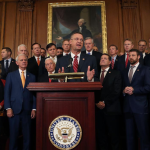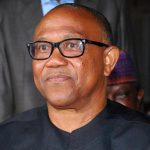Nigerian women have suffered some setbacks while venturing into politics, due to marginalization in both voting exercises, and the allocation of political offices.
The social stigma and political violence that characterizes politics are also stumbling blocks for women to be actively involved in Nigerian politics.
During the 2023 general election, the 18 registered political parties in Nigeria, fielded a total of 380 female candidates to contest for the 468 seats in both chambers of the National Assembly.
Out of the 92 female contestants for the Senate, only 3 won their election, while 15 out of 288 won their House of Representatives seats. This figure represents less than 4% of female representation in the 10th National Assembly.
Also Read: Presidential Election Petition Court: Peter Obi, Labour Party witnesses called to give oral, video evidence
The story is the same for the State House of Assembly, where an insignificant 48 candidates out of 1,019 female candidates contested for seats in their respective State constituencies.
Comfort Anwe was the only female in the 34-member Kaduna State House of Assembly between 2019 and 2023. Her efforts to seek re-election in the last election met stiff opposition, as she lost in controversial circumstances.

Several Nigerian women like Comfort Anwe, have contested for elective positions at various levels, but their efforts seemed not to have translated into appreciative gains.
Men’s dominance in party membership tends to affect women when it comes to either selecting or electing candidates for positions.
According to gender experts, the social, cultural, and religious demands of different Nigerian societies, most often tend to relegate women to the background.
Also, the lack of adequate education and finance limits effective female participation in Nigerian politics.
Despite constituting over 47% of the voting population, access to political positions has remained elusive. But on the global scene, Nigerian women are contributing significantly to leadership and governance.
It now behooves the new administration not to overlook the potential of women, when constituting their cabinets, both at the federal and state levels, to create gender equity in governance.
(Editor: Terverr Tyav)








